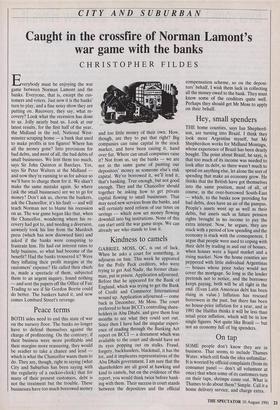CITY AND SUBURBAN
Caught in the crossfire of Norman Lamont's war game with the banks
CHRISTOPHER FILDES
Everybody must be enjoying the war game between Norman Lamont and the banks. Everyone, that is, except the cus- tomers and voters. Just now it is the banks' turn to play, and a fine noisy show they are putting on. Recovery, they say, what re- covery? Look what the recession has done to us. Jolly nearly bust us. Look at our latest results, for the first half of the year, the Midland in the red, National West- minster scraping home — a bank that used to make profits in ten figures! Where has all the money gone? Into provisions for bad debts, and most of all, the bad debts of small businesses. We lent them too much, says Sir John Quinton at Barclays. Yes, says Sir Peter Walters at the Midland and now they're running to us for advice so we'll have to charge them for it. We shan't make the same mistake again. So where (ask the small businesses) are we to go for money? Don't ask us, chorus the bankers, ask the Chancellor, it's his fault — and will teach Norman not to blame his recession on us. The war game began like that, when the Chancellor, wondering where his re- covery had got to, and needing a diversion, unwisely took his line from the Murdoch press (which has now disowned him) and asked if the banks were conspiring to frustrate him. He had cut interest rates to help business, so what had become of the benefit? Had the banks trousered it? Were they inflating their profit margins at the customers' expense? He called their chiefs in, made a spectacle of them, subjected them to an urgent inquiry, found nothing — and sent the papers off the Office of Fair Trading to see if Sir Gordon Borrie could do better. The bankers hated it, and now comes Lombard Street's revenge.


















































 Previous page
Previous page